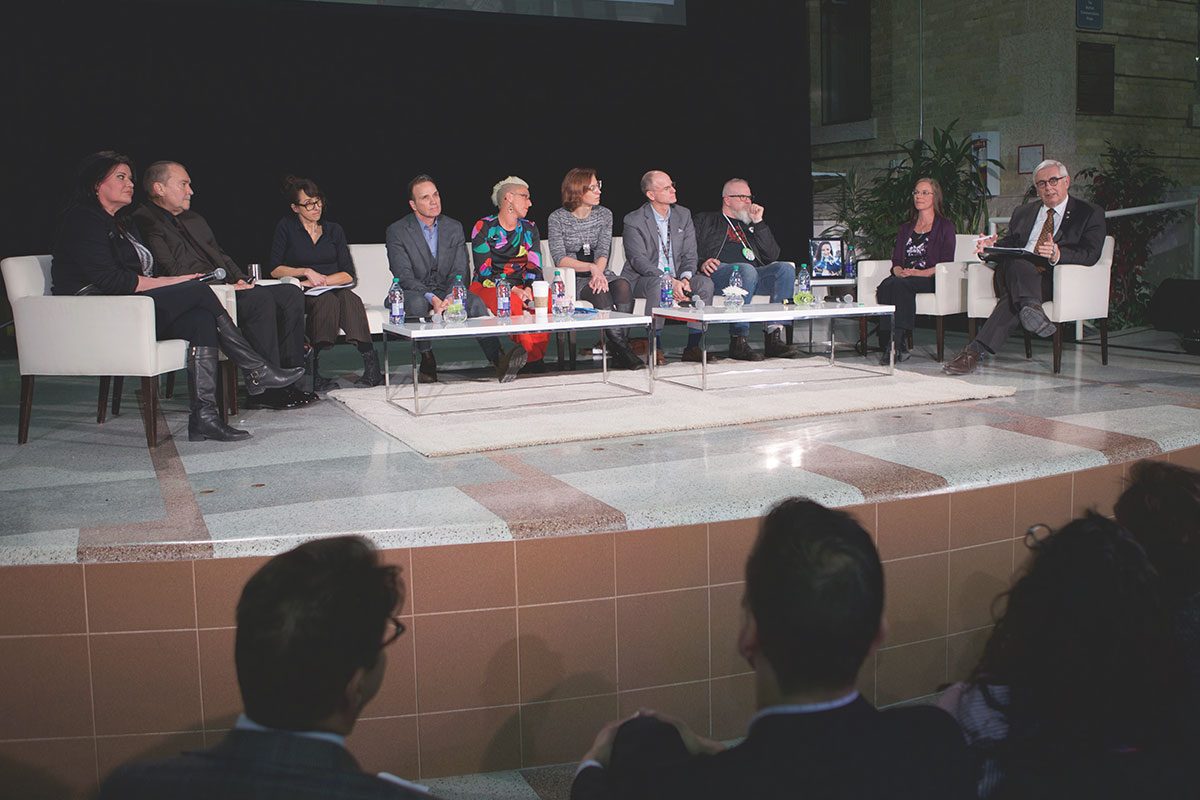
Visionary Conversations draws hundreds for discussion on combating impacts of drug addiction
More than 300 people attended the final Visionary Conversations held on March 5, 2020 at the Bannatyne campus. For nearly a decade, President and Vice-Chancellor David T. Barnard has hosted the award-winning series, which launched in September 2011.
“Throughout this series, we have striven to confront challenges facing our community and to frame them in such a way that we might understand them and develop effective approaches to dealing with them,” said Barnard.
The final topic focused on how our community can come together to combat the impacts of drug addiction. Departing from the usual format for the series, distinguished experts from among faculty, alumni and partners in the community were invited up as the conversation expanded, with nine speakers in total joining the conversation with Dr. Barnard, providing a broad range of expertise and perspectives.
Dr. Tamara Taillieu [BA/05, BHEc/08, MSc/11, PhD/19], an instructor in community health sciences, started the evening off sharing her personal experience with drug addiction through the loss of her niece, Destiny Taillieu [BA/19], who died of an accidental fentanyl overdose on November 4, 2018. Taillieu shared that in the weeks leading up to her death that Destiny was waiting to get help and that the system is lacking resources in the time between detox and recovery programs. “People are dying in the gap,” said Taillieu.
“We don’t have a system [to address addiction], we have silos of individual programs,” said Dr. Erin Knight [BesSc/05, BSc(Hons)/09, MD/13], Lecturer in the Max Rady College of Medicine’s psychiatry department and medical director of the Addictions Unit at Winnipeg’s Health Sciences Centre. “The biggest problem I see is that we need to build a system!”
“It’s a crucial and uncomfortable dialogue we need to have,” said Melanie McKinnon “Addiction is not discriminatory to class, income or culture. Unfortunately, the Indigenous culture is heavy hit by addictions due to the impacts of adverse childhood experiences and other socioeconomic factors.”
Rick Lees, executive director of the Main Street Project drew a parallel to the AIDS epidemic and how it was responded to from a moral judgement and perspective. “We need to move the conversation away from how you get it and talk about the disease,” said Lees.
“We need to listen to the mothers, who have the knowledge,” said Mitch Bourbonniere [BSW/87, MSW/95], founding member of the original Bear Clan Patrol, who is now affiliated with the Mama Bear Clan Patrol.
Chief Danny Smyth commented that he has worked with many of the panel members over the years. Smyth said, “Government has been slow to respond to this, to what I think is the tip of the iceberg in terms of the impact addiction is having in our community. The police service members are seeing increased behavior calls as a result of the erratic or aggressive behaviours associated with meth use – it by far overshadows opioids because of the erratic behaviours it causes.”
Smyth commended the grassroots organizations represented on the panel and others, like Bear Clan Patrol, Mama Bear Clan, Main Street Project, Morberg House and O.P.K. “There is tremendous community-led work happening. The Bear Clan does a tremendous service just in picking up the discarded needles in our community.” He strongly encouraged those who can volunteer their time, to consider doing so to these organizations, and if not their time, their resources.
There was an overall consensus among the panelists that a change in focus and thinking is needed: addiction is a chronic disease and should be approached as we do any other chronic disease like diabetes and cardiovascular disease, from a treatment perspective. The focus needs to shift from the short term solution to a long term plan, because addiction is a lifelong disease.
Barnard closed off the evening on an optimistic note, “As I come to the conclusion of my term as President and Vice-Chancellor of the University of Manitoba, it is my hope that these conversations have brought us all closer to understanding how we could live together in a better world.”
What follows is a short retrospective video of the series.
Visit the umanitoba.ca/visionaryconversations website to view a video of the March 5 discussion.
Research at the University of Manitoba is partially supported by funding from the Government of Canada Research Support Fund.






